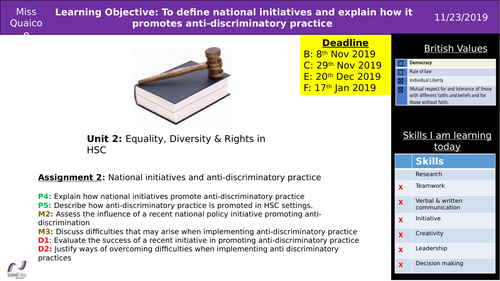Anti-discriminatory practice is a set of values and behaviors that aim to eliminate discrimination, inequality, and prejudice from our interactions with others. It involves actively challenging and opposing any forms of discrimination, whether intentional or unintentional, and working towards creating a more inclusive and equitable society.
Discrimination can take many forms, including but not limited to race, ethnicity, religion, gender, sexual orientation, age, disability, and socio-economic status. It can manifest itself in a variety of ways, such as through verbal or physical abuse, exclusion, or unequal treatment.
Anti-discriminatory practice involves recognizing and acknowledging the existence of these forms of discrimination, and taking steps to address and eliminate them. This can involve educating oneself about different cultures and identities, and actively working to create a more inclusive and welcoming environment for all.
For example, in a healthcare setting, anti-discriminatory practice might involve providing interpretation services for patients who do not speak the same language as the healthcare provider, or ensuring that all patients are treated with respect and dignity regardless of their age, gender, or cultural background.
Anti-discriminatory practice also involves challenging and opposing any forms of discrimination or prejudice that we may encounter in our daily lives. This can involve speaking up when we see or hear something that is discriminatory, or taking steps to support those who may be affected by discrimination.
Overall, anti-discriminatory practice is about recognizing and respecting the inherent value and dignity of every person, and working towards creating a more inclusive and just society. It is an ongoing process that requires ongoing education, reflection, and action. By committing to anti-discriminatory practice, we can create a more fair and equitable world for all.




